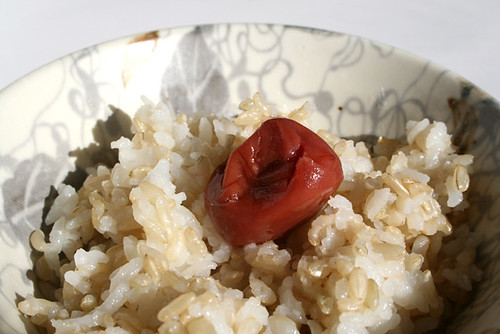 This is a personal post about being lost in culinary hell and finding the path home again with a little help from my Japanese friends. In case someone out there might be in the same situation that I was in, I hope this helps and inspires.
If I sound like a self-holy, born-again foodie asshole please let me know. I hate those types of people.
This is a personal post about being lost in culinary hell and finding the path home again with a little help from my Japanese friends. In case someone out there might be in the same situation that I was in, I hope this helps and inspires.
If I sound like a self-holy, born-again foodie asshole please let me know. I hate those types of people.
+++
In January 2005 when I quit my job, rented out my Copenhagen apartment and moved to Tokyo, I knew I was in for an adventure.
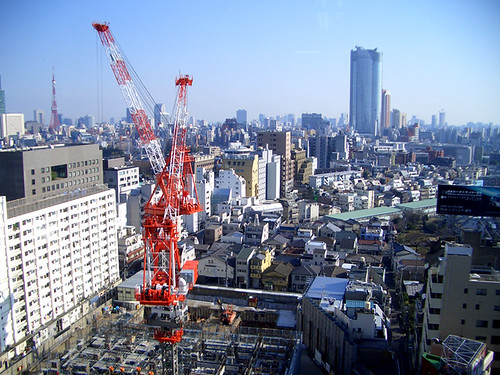 View across central Tokyo from a skyscraper. Spring 2005.
View across central Tokyo from a skyscraper. Spring 2005.
Back then, before leaving Denmark and my busy design day job, my diet consisted roughly of a dairy breakfast with lots of fiber and fruit, canteen lunches with meat, potatoes and cake for dessert, and then takeaway for dinner when coming home late from work. I've always hated cooking--I felt it was a waste of limited time, and the food was gone in two seconds in front of the TV anyway. And with a busy schedule it seemed fair to reward myself with expensive takeaway at the end of the day. Shops close early in Denmark and I always came home after that, so there was really no choice.
I ate everything and was only allergic to tomatoes and corn, as my doctor had tested and concluded. And I basically felt fine.
Until I came to Japan.
I don't know why, but my body started to change. Living in Shinjuku, actually ON
Shinuku-dori, the main street through the most busy section in Japan, I started to get sick quite often and my immune system seemed to go spastic, which puzzled me as my diet had never been healthier.
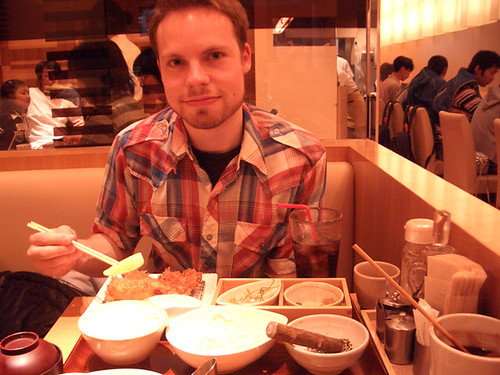 Restaurant in Yokohama. We waited in line for 90 minutes as is customary on weekends in Japan. May 2005.
Restaurant in Yokohama. We waited in line for 90 minutes as is customary on weekends in Japan. May 2005.
I had sushi almost every other day, lots of
onigiri for lunch, fresh fish and rice from local street vendors and never ate a hamburger or drank soda. But I didn't feel well. The combination of constant street noise pollution, smelling garbage in the back streets, constant focus on consumerism and conformity, and a growing feeling of lostness on the big spaceship of Tokyo made me sick in my body and mind.
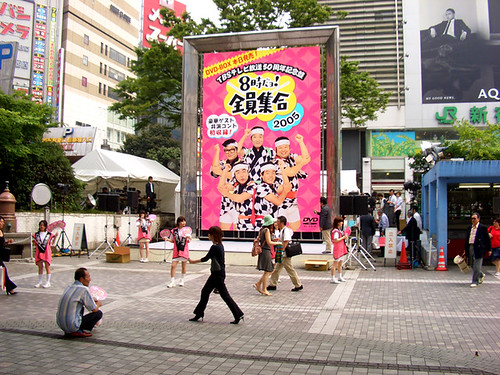 Street advertising for a comedy show DVD release, Shinjuku. Ads are everywhere--buy, consume, throw away and buy more! Summer 2005.
Street advertising for a comedy show DVD release, Shinjuku. Ads are everywhere--buy, consume, throw away and buy more! Summer 2005.
I missed open spaces, clean air, knowing what I was eating half the time (takes a lot of kanji skills to read food labels and restaurant menus) and not being treated like an alien or stupid
gaijin tourist, which you always will in Japan, no matter if you've lived there for 20 years or one week. The country is so vast and concentrated with a full-bodied Japanese culture, that's just how it is with island nations. It gets tiring after a while.
So I caved in and returned home after 12 months of loving and loathing. Mainly because I was tired of falling sick.
It was great coming home to Copenhagen again, the clean air, the beautiful and thought out city planning, the bright nights of Scandinavia, seeing old friends and eating comfort food.
 Copenhagen ice lakes. January 2006.
Copenhagen ice lakes. January 2006.
But something had changed. When I had a glass of milk my body instantly went berserk. And when I ate the normal dairy products that I used to, I got sick. I felt bloated, really tired and had pains in my stomach and chest. It seemed I had developed a dairy allergy. Dairy isn't a big part of Japanese food culture, and so I almost hadn't had milk or cheese for a whole year.
Gradually over the next years I started to feel worse. My body reacted similarly to other foods and by winter 2010 I was really desperate. Every meal, every snack made me sick. The doctors tested me for allergies several times, lactose checked me for intolerance twice and had me go through an unpleasant assortment of hospital tests. All with no diagnosis, everything seemed fine, all my stats were great and I wasn't officially sick in any way. So with no help from that front, I went to alternative clinics, spending over $2000 in tests and alternative medicine. Some of it really silly products, like eating zinc powder with a spoon. And all to no avail, nothing helped.
Then, in April 2011 I went to California to visit fellow Umamimart writers
Yoko and
Washi, who had relocated from Tokyo to Berkeley. I dreaded the flight and the food and as feared I spent 25 hours in transit hell. But I instantly fell in love with Berkeley when I arrived. Over the next days, Yoko and Washi kept to their daily schedule: eating Japanese food as they've always done. Rice, miso soup, fresh grilled fish, simple dishes and pure ingredients.
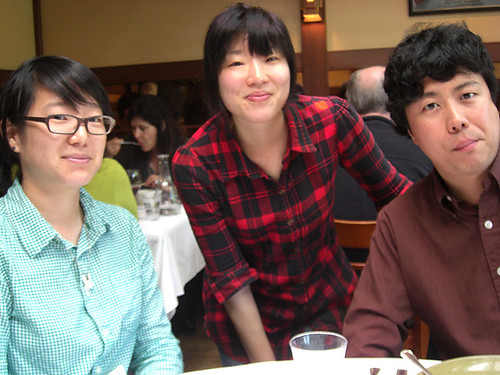 Cindy aka artist Wormfun, Yoko and a chewing Washi at fancy Berkeley restaurant Chez Panisse. April 2011.
Cindy aka artist Wormfun, Yoko and a chewing Washi at fancy Berkeley restaurant Chez Panisse. April 2011.
And something weird slowly happened. I noticed it one day when out walking how great I suddenly felt. I couldn't remember the last time I'd felt so relaxed and painless, it was like I was on valium. After one week in Berkeley, Yoko and I started our planned roadtrip down south and after a day or two I started to feel bad again. We had roadside hamburgers, fries, sandwiches, nachos etc., which was so delicious that I ate it all, but at the same time I couldn't help but notice the sudden break from feeling good in Berkeley. Was it the water there? Was it the clean air? The famed organic pride of the hippie town?
One day when hiking in Grand Canyon, I approached Yoko with my dilemma. Being an expert on all foods in general (or anything else, for that matter), I asked if she had any idea what might be wrong with me. How come I felt so good when staying at her house? She suggested it might be my diet. Could it be that it was because I had mostly eaten Japanese food when being at home with them?
When I returned home to Copenhagen, the first thing I did was bike down to my local Asian market and buy all basic ingredients for Japanese cooking. I also found an old book I'd bought in 2006 about Japanese cooking:
Japanese Women Don't Get Old or Fat by Naomi Moriyama. (Yes, I know it's geared towards women, but men can read it too).
That book, along with Yoko's advice has changed my life around completely. I have now spent the last two months eating 95% home cooked Japanese food every day.
And I feel great!
After so many years of not knowing what to eat and always being afraid of food, I now have a clear vision of what to eat without getting sick. It's truly a gift from the gods.
I still get sick instantly when eating a steak, a pizza, any bread, pasta, spicy food, fruit in general, cake or ice cream. I imagine it might have something to do with a mix of chemical sugars and fibers. But I have no real idea.
Funny how all the doctors, clinics and tests have fallen short--all I really needed was a friendly advice from Yoko, and study her column Japanify,
here on Umamimart.
So, if you're a reader out there who's not feeling well when you eat "normal" regular food--I suggest you buy that aforementioned book and start experimenting with Japanese food. It's very easy on the body, fresh, not hard at all to cook--and everyone loves it.
I want to conclude this post with a an assortment of dishes I regularly cook now. My friends love it when I make it for them.
+++
BREAKFAST
As we've all heard, breakfast is the most important meal of the day and to me that ain't no lie. I can't live without my homemade miso soup with lots of different vegetables and rice to start the day. When I go to bed at night I already look forward to that first, fresh slurp of steaming hot miso juice. Without sounding like an idiot, I honestly can't imagine people eating white bread, sugary donuts with butter and oily coffee each morning. How can that be good for anyone?? Might as well start the day with a big scoop of Ben & Jerry's.)
I boil two cups (approx 0.5 litres) of
dashi and
wakame seaweed.
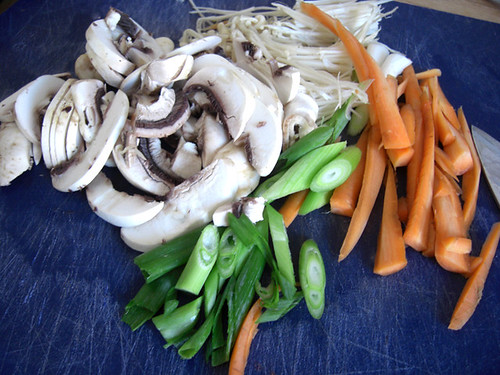 Here I chopped up enoki mushrooms, spring onions, Danish champignons and organic carrots. The vegetables change according to what inspires me in the supermarket.
Here I chopped up enoki mushrooms, spring onions, Danish champignons and organic carrots. The vegetables change according to what inspires me in the supermarket.
I always add one XL organic egg for some protein.
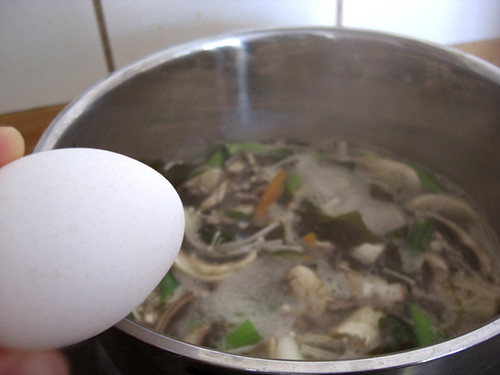
I also add chopped, firm tofu and bring it all to a boil, before adding the egg.
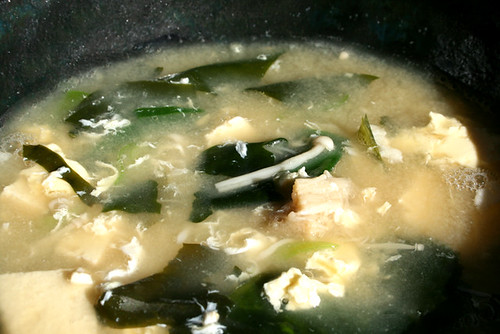
Finally when I remove the soup from the heat and the temperature has lowered, I add one spoon of white miso and one spoon of red miso.
If any reader knows where to find low sodium miso online, please let me know! Normal miso is very salty and I'd like to cut down on my salt intake. Unfortunately no one imports low sodium miso to Denmark. Actually you can barely find miso in Copenhagen, bleh.
Big, juicy Portobello mushrooms are my fave addition to the soup these days.
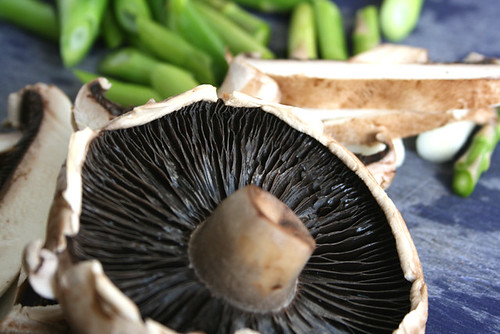
Need my bowl of rice for every meal. The
umeboshi (pickled plum) is a rare treat, as they seldomly appear in Asian stores here and are very expensive.
 LUNCH
LUNCH
Green, quickly blanched asparagus. Crunchy.
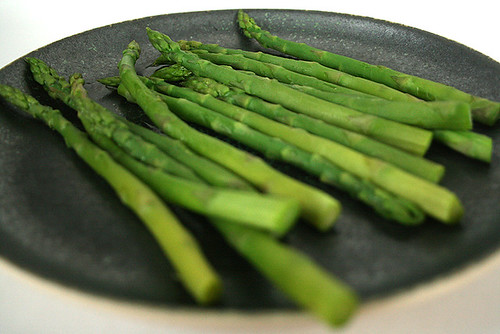
Freshly rolled sushi maki with cucumber, mackerel, avocado and Danish organic carrots. Soy dip on the side.
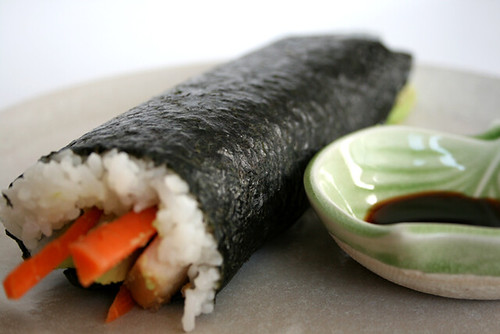
Afternoon snack: dried goji berries.
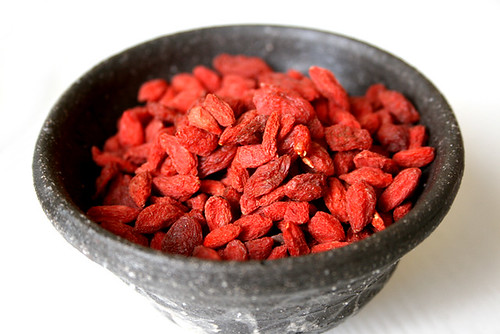 DINNER
DINNER
Big Danish Western Sea shrimps marinated in freshly squeezed ginger juice and rolled in
panko (Japanese bread crumbs).
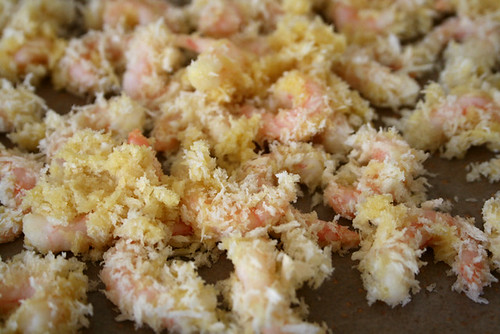
Lightly wok-fried in a little oil.
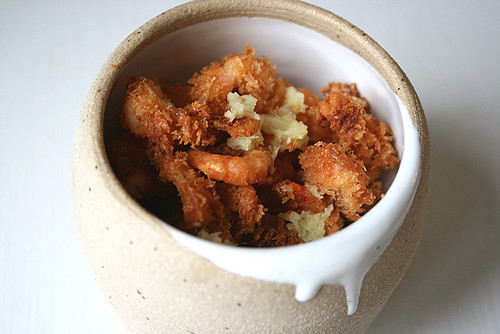
Adding shredded ginger for extra bite. Soy on the side as dip.
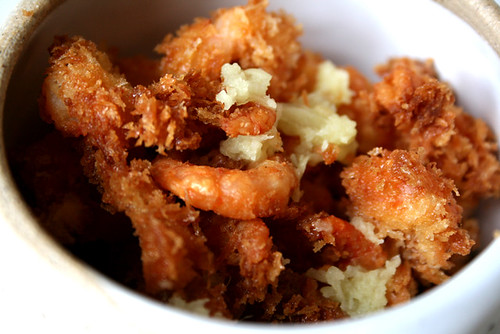
Wok-fried vegetables in miso sauce and roasted sesame seeds.
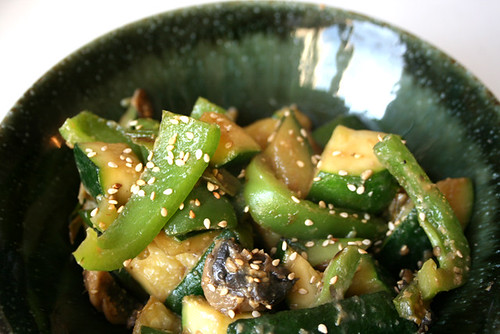
Twice-cooked saba,
a la Yoko.
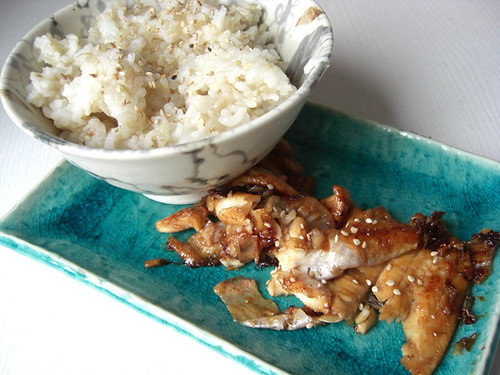
And finally one of my favourite dishes, a variation of
goma-ae (a bit like Yoko's
shira-ae, but without the tofu). I buy fresh, big leaves, pluck them and wash all the dirt off.
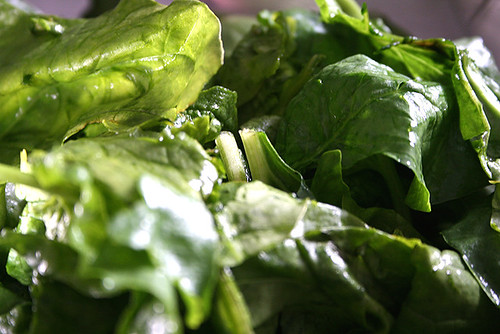
Bring lots of water to the boil and cook the spinach for 30 seconds, just enough to break the fibers but retaining its crunch.
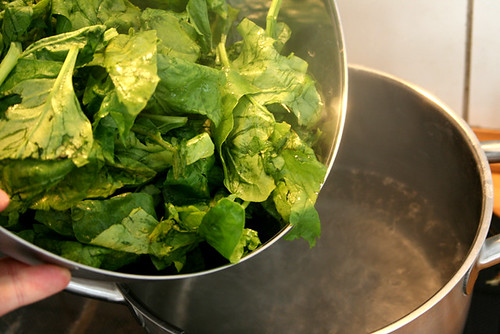
Grind roasted sesame seeds with soy, a little
mirin and a dab of water.
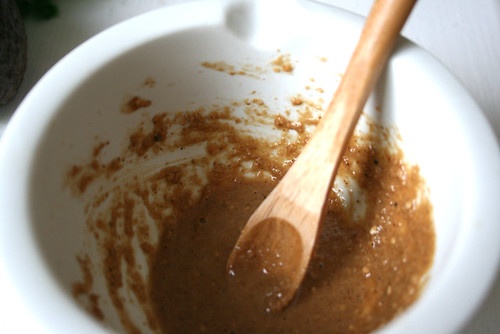
Mix into the cooled spinach and you're ready to eat!
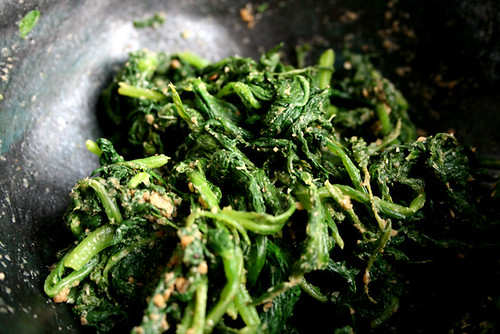
Thank you to the Japanify kitchen and its Yoda Master Yoko, my friend in need.
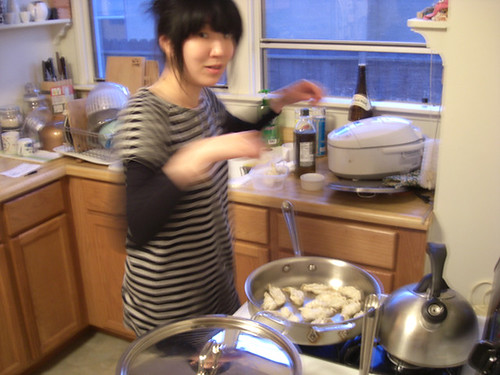
<3.
 This is a personal post about being lost in culinary hell and finding the path home again with a little help from my Japanese friends. In case someone out there might be in the same situation that I was in, I hope this helps and inspires.
If I sound like a self-holy, born-again foodie asshole please let me know. I hate those types of people.
+++
In January 2005 when I quit my job, rented out my Copenhagen apartment and moved to Tokyo, I knew I was in for an adventure.
This is a personal post about being lost in culinary hell and finding the path home again with a little help from my Japanese friends. In case someone out there might be in the same situation that I was in, I hope this helps and inspires.
If I sound like a self-holy, born-again foodie asshole please let me know. I hate those types of people.
+++
In January 2005 when I quit my job, rented out my Copenhagen apartment and moved to Tokyo, I knew I was in for an adventure.
 View across central Tokyo from a skyscraper. Spring 2005.
Back then, before leaving Denmark and my busy design day job, my diet consisted roughly of a dairy breakfast with lots of fiber and fruit, canteen lunches with meat, potatoes and cake for dessert, and then takeaway for dinner when coming home late from work. I've always hated cooking--I felt it was a waste of limited time, and the food was gone in two seconds in front of the TV anyway. And with a busy schedule it seemed fair to reward myself with expensive takeaway at the end of the day. Shops close early in Denmark and I always came home after that, so there was really no choice.
I ate everything and was only allergic to tomatoes and corn, as my doctor had tested and concluded. And I basically felt fine.
Until I came to Japan.
I don't know why, but my body started to change. Living in Shinjuku, actually ON Shinuku-dori, the main street through the most busy section in Japan, I started to get sick quite often and my immune system seemed to go spastic, which puzzled me as my diet had never been healthier.
View across central Tokyo from a skyscraper. Spring 2005.
Back then, before leaving Denmark and my busy design day job, my diet consisted roughly of a dairy breakfast with lots of fiber and fruit, canteen lunches with meat, potatoes and cake for dessert, and then takeaway for dinner when coming home late from work. I've always hated cooking--I felt it was a waste of limited time, and the food was gone in two seconds in front of the TV anyway. And with a busy schedule it seemed fair to reward myself with expensive takeaway at the end of the day. Shops close early in Denmark and I always came home after that, so there was really no choice.
I ate everything and was only allergic to tomatoes and corn, as my doctor had tested and concluded. And I basically felt fine.
Until I came to Japan.
I don't know why, but my body started to change. Living in Shinjuku, actually ON Shinuku-dori, the main street through the most busy section in Japan, I started to get sick quite often and my immune system seemed to go spastic, which puzzled me as my diet had never been healthier.
 Restaurant in Yokohama. We waited in line for 90 minutes as is customary on weekends in Japan. May 2005.
I had sushi almost every other day, lots of onigiri for lunch, fresh fish and rice from local street vendors and never ate a hamburger or drank soda. But I didn't feel well. The combination of constant street noise pollution, smelling garbage in the back streets, constant focus on consumerism and conformity, and a growing feeling of lostness on the big spaceship of Tokyo made me sick in my body and mind.
Restaurant in Yokohama. We waited in line for 90 minutes as is customary on weekends in Japan. May 2005.
I had sushi almost every other day, lots of onigiri for lunch, fresh fish and rice from local street vendors and never ate a hamburger or drank soda. But I didn't feel well. The combination of constant street noise pollution, smelling garbage in the back streets, constant focus on consumerism and conformity, and a growing feeling of lostness on the big spaceship of Tokyo made me sick in my body and mind.
 Street advertising for a comedy show DVD release, Shinjuku. Ads are everywhere--buy, consume, throw away and buy more! Summer 2005.
I missed open spaces, clean air, knowing what I was eating half the time (takes a lot of kanji skills to read food labels and restaurant menus) and not being treated like an alien or stupid gaijin tourist, which you always will in Japan, no matter if you've lived there for 20 years or one week. The country is so vast and concentrated with a full-bodied Japanese culture, that's just how it is with island nations. It gets tiring after a while.
So I caved in and returned home after 12 months of loving and loathing. Mainly because I was tired of falling sick.
It was great coming home to Copenhagen again, the clean air, the beautiful and thought out city planning, the bright nights of Scandinavia, seeing old friends and eating comfort food.
Street advertising for a comedy show DVD release, Shinjuku. Ads are everywhere--buy, consume, throw away and buy more! Summer 2005.
I missed open spaces, clean air, knowing what I was eating half the time (takes a lot of kanji skills to read food labels and restaurant menus) and not being treated like an alien or stupid gaijin tourist, which you always will in Japan, no matter if you've lived there for 20 years or one week. The country is so vast and concentrated with a full-bodied Japanese culture, that's just how it is with island nations. It gets tiring after a while.
So I caved in and returned home after 12 months of loving and loathing. Mainly because I was tired of falling sick.
It was great coming home to Copenhagen again, the clean air, the beautiful and thought out city planning, the bright nights of Scandinavia, seeing old friends and eating comfort food.
 Copenhagen ice lakes. January 2006.
But something had changed. When I had a glass of milk my body instantly went berserk. And when I ate the normal dairy products that I used to, I got sick. I felt bloated, really tired and had pains in my stomach and chest. It seemed I had developed a dairy allergy. Dairy isn't a big part of Japanese food culture, and so I almost hadn't had milk or cheese for a whole year.
Gradually over the next years I started to feel worse. My body reacted similarly to other foods and by winter 2010 I was really desperate. Every meal, every snack made me sick. The doctors tested me for allergies several times, lactose checked me for intolerance twice and had me go through an unpleasant assortment of hospital tests. All with no diagnosis, everything seemed fine, all my stats were great and I wasn't officially sick in any way. So with no help from that front, I went to alternative clinics, spending over $2000 in tests and alternative medicine. Some of it really silly products, like eating zinc powder with a spoon. And all to no avail, nothing helped.
Then, in April 2011 I went to California to visit fellow Umamimart writers Yoko and Washi, who had relocated from Tokyo to Berkeley. I dreaded the flight and the food and as feared I spent 25 hours in transit hell. But I instantly fell in love with Berkeley when I arrived. Over the next days, Yoko and Washi kept to their daily schedule: eating Japanese food as they've always done. Rice, miso soup, fresh grilled fish, simple dishes and pure ingredients.
Copenhagen ice lakes. January 2006.
But something had changed. When I had a glass of milk my body instantly went berserk. And when I ate the normal dairy products that I used to, I got sick. I felt bloated, really tired and had pains in my stomach and chest. It seemed I had developed a dairy allergy. Dairy isn't a big part of Japanese food culture, and so I almost hadn't had milk or cheese for a whole year.
Gradually over the next years I started to feel worse. My body reacted similarly to other foods and by winter 2010 I was really desperate. Every meal, every snack made me sick. The doctors tested me for allergies several times, lactose checked me for intolerance twice and had me go through an unpleasant assortment of hospital tests. All with no diagnosis, everything seemed fine, all my stats were great and I wasn't officially sick in any way. So with no help from that front, I went to alternative clinics, spending over $2000 in tests and alternative medicine. Some of it really silly products, like eating zinc powder with a spoon. And all to no avail, nothing helped.
Then, in April 2011 I went to California to visit fellow Umamimart writers Yoko and Washi, who had relocated from Tokyo to Berkeley. I dreaded the flight and the food and as feared I spent 25 hours in transit hell. But I instantly fell in love with Berkeley when I arrived. Over the next days, Yoko and Washi kept to their daily schedule: eating Japanese food as they've always done. Rice, miso soup, fresh grilled fish, simple dishes and pure ingredients.
 Cindy aka artist Wormfun, Yoko and a chewing Washi at fancy Berkeley restaurant Chez Panisse. April 2011.
And something weird slowly happened. I noticed it one day when out walking how great I suddenly felt. I couldn't remember the last time I'd felt so relaxed and painless, it was like I was on valium. After one week in Berkeley, Yoko and I started our planned roadtrip down south and after a day or two I started to feel bad again. We had roadside hamburgers, fries, sandwiches, nachos etc., which was so delicious that I ate it all, but at the same time I couldn't help but notice the sudden break from feeling good in Berkeley. Was it the water there? Was it the clean air? The famed organic pride of the hippie town?
One day when hiking in Grand Canyon, I approached Yoko with my dilemma. Being an expert on all foods in general (or anything else, for that matter), I asked if she had any idea what might be wrong with me. How come I felt so good when staying at her house? She suggested it might be my diet. Could it be that it was because I had mostly eaten Japanese food when being at home with them?
When I returned home to Copenhagen, the first thing I did was bike down to my local Asian market and buy all basic ingredients for Japanese cooking. I also found an old book I'd bought in 2006 about Japanese cooking: Japanese Women Don't Get Old or Fat by Naomi Moriyama. (Yes, I know it's geared towards women, but men can read it too).
That book, along with Yoko's advice has changed my life around completely. I have now spent the last two months eating 95% home cooked Japanese food every day.
And I feel great!
After so many years of not knowing what to eat and always being afraid of food, I now have a clear vision of what to eat without getting sick. It's truly a gift from the gods.
I still get sick instantly when eating a steak, a pizza, any bread, pasta, spicy food, fruit in general, cake or ice cream. I imagine it might have something to do with a mix of chemical sugars and fibers. But I have no real idea.
Funny how all the doctors, clinics and tests have fallen short--all I really needed was a friendly advice from Yoko, and study her column Japanify, here on Umamimart.
So, if you're a reader out there who's not feeling well when you eat "normal" regular food--I suggest you buy that aforementioned book and start experimenting with Japanese food. It's very easy on the body, fresh, not hard at all to cook--and everyone loves it.
I want to conclude this post with a an assortment of dishes I regularly cook now. My friends love it when I make it for them.
+++
BREAKFAST
As we've all heard, breakfast is the most important meal of the day and to me that ain't no lie. I can't live without my homemade miso soup with lots of different vegetables and rice to start the day. When I go to bed at night I already look forward to that first, fresh slurp of steaming hot miso juice. Without sounding like an idiot, I honestly can't imagine people eating white bread, sugary donuts with butter and oily coffee each morning. How can that be good for anyone?? Might as well start the day with a big scoop of Ben & Jerry's.)
I boil two cups (approx 0.5 litres) of dashi and wakame seaweed.
Cindy aka artist Wormfun, Yoko and a chewing Washi at fancy Berkeley restaurant Chez Panisse. April 2011.
And something weird slowly happened. I noticed it one day when out walking how great I suddenly felt. I couldn't remember the last time I'd felt so relaxed and painless, it was like I was on valium. After one week in Berkeley, Yoko and I started our planned roadtrip down south and after a day or two I started to feel bad again. We had roadside hamburgers, fries, sandwiches, nachos etc., which was so delicious that I ate it all, but at the same time I couldn't help but notice the sudden break from feeling good in Berkeley. Was it the water there? Was it the clean air? The famed organic pride of the hippie town?
One day when hiking in Grand Canyon, I approached Yoko with my dilemma. Being an expert on all foods in general (or anything else, for that matter), I asked if she had any idea what might be wrong with me. How come I felt so good when staying at her house? She suggested it might be my diet. Could it be that it was because I had mostly eaten Japanese food when being at home with them?
When I returned home to Copenhagen, the first thing I did was bike down to my local Asian market and buy all basic ingredients for Japanese cooking. I also found an old book I'd bought in 2006 about Japanese cooking: Japanese Women Don't Get Old or Fat by Naomi Moriyama. (Yes, I know it's geared towards women, but men can read it too).
That book, along with Yoko's advice has changed my life around completely. I have now spent the last two months eating 95% home cooked Japanese food every day.
And I feel great!
After so many years of not knowing what to eat and always being afraid of food, I now have a clear vision of what to eat without getting sick. It's truly a gift from the gods.
I still get sick instantly when eating a steak, a pizza, any bread, pasta, spicy food, fruit in general, cake or ice cream. I imagine it might have something to do with a mix of chemical sugars and fibers. But I have no real idea.
Funny how all the doctors, clinics and tests have fallen short--all I really needed was a friendly advice from Yoko, and study her column Japanify, here on Umamimart.
So, if you're a reader out there who's not feeling well when you eat "normal" regular food--I suggest you buy that aforementioned book and start experimenting with Japanese food. It's very easy on the body, fresh, not hard at all to cook--and everyone loves it.
I want to conclude this post with a an assortment of dishes I regularly cook now. My friends love it when I make it for them.
+++
BREAKFAST
As we've all heard, breakfast is the most important meal of the day and to me that ain't no lie. I can't live without my homemade miso soup with lots of different vegetables and rice to start the day. When I go to bed at night I already look forward to that first, fresh slurp of steaming hot miso juice. Without sounding like an idiot, I honestly can't imagine people eating white bread, sugary donuts with butter and oily coffee each morning. How can that be good for anyone?? Might as well start the day with a big scoop of Ben & Jerry's.)
I boil two cups (approx 0.5 litres) of dashi and wakame seaweed.
 Here I chopped up enoki mushrooms, spring onions, Danish champignons and organic carrots. The vegetables change according to what inspires me in the supermarket.
I always add one XL organic egg for some protein.
Here I chopped up enoki mushrooms, spring onions, Danish champignons and organic carrots. The vegetables change according to what inspires me in the supermarket.
I always add one XL organic egg for some protein.
 I also add chopped, firm tofu and bring it all to a boil, before adding the egg.
I also add chopped, firm tofu and bring it all to a boil, before adding the egg.
 Finally when I remove the soup from the heat and the temperature has lowered, I add one spoon of white miso and one spoon of red miso.
If any reader knows where to find low sodium miso online, please let me know! Normal miso is very salty and I'd like to cut down on my salt intake. Unfortunately no one imports low sodium miso to Denmark. Actually you can barely find miso in Copenhagen, bleh.
Big, juicy Portobello mushrooms are my fave addition to the soup these days.
Finally when I remove the soup from the heat and the temperature has lowered, I add one spoon of white miso and one spoon of red miso.
If any reader knows where to find low sodium miso online, please let me know! Normal miso is very salty and I'd like to cut down on my salt intake. Unfortunately no one imports low sodium miso to Denmark. Actually you can barely find miso in Copenhagen, bleh.
Big, juicy Portobello mushrooms are my fave addition to the soup these days.
 Need my bowl of rice for every meal. The umeboshi (pickled plum) is a rare treat, as they seldomly appear in Asian stores here and are very expensive.
Need my bowl of rice for every meal. The umeboshi (pickled plum) is a rare treat, as they seldomly appear in Asian stores here and are very expensive.
 LUNCH
Green, quickly blanched asparagus. Crunchy.
LUNCH
Green, quickly blanched asparagus. Crunchy.
 Freshly rolled sushi maki with cucumber, mackerel, avocado and Danish organic carrots. Soy dip on the side.
Freshly rolled sushi maki with cucumber, mackerel, avocado and Danish organic carrots. Soy dip on the side.
 Afternoon snack: dried goji berries.
Afternoon snack: dried goji berries.
 DINNER
Big Danish Western Sea shrimps marinated in freshly squeezed ginger juice and rolled in panko (Japanese bread crumbs).
DINNER
Big Danish Western Sea shrimps marinated in freshly squeezed ginger juice and rolled in panko (Japanese bread crumbs).
 Lightly wok-fried in a little oil.
Lightly wok-fried in a little oil.
 Adding shredded ginger for extra bite. Soy on the side as dip.
Adding shredded ginger for extra bite. Soy on the side as dip.
 Wok-fried vegetables in miso sauce and roasted sesame seeds.
Wok-fried vegetables in miso sauce and roasted sesame seeds.
 Twice-cooked saba, a la Yoko.
Twice-cooked saba, a la Yoko.
 And finally one of my favourite dishes, a variation of goma-ae (a bit like Yoko's shira-ae, but without the tofu). I buy fresh, big leaves, pluck them and wash all the dirt off.
And finally one of my favourite dishes, a variation of goma-ae (a bit like Yoko's shira-ae, but without the tofu). I buy fresh, big leaves, pluck them and wash all the dirt off.
 Bring lots of water to the boil and cook the spinach for 30 seconds, just enough to break the fibers but retaining its crunch.
Bring lots of water to the boil and cook the spinach for 30 seconds, just enough to break the fibers but retaining its crunch.
 Grind roasted sesame seeds with soy, a little mirin and a dab of water.
Grind roasted sesame seeds with soy, a little mirin and a dab of water.
 Mix into the cooled spinach and you're ready to eat!
Mix into the cooled spinach and you're ready to eat!
 Thank you to the Japanify kitchen and its Yoda Master Yoko, my friend in need.
Thank you to the Japanify kitchen and its Yoda Master Yoko, my friend in need.
 <3.
<3.



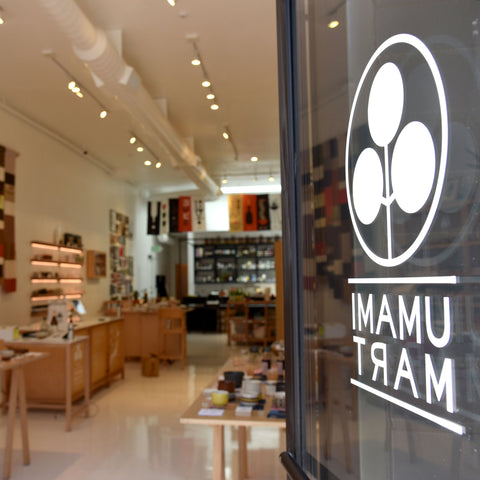
Comments (14)
Great post Anders. I think once you hit your thirties you start seeing weird changes in your body. I started having problems late last year and have been going for allergy tests which are coming back negative. I have to admit I can’t be arsed to cook everyday and tend to settle for pasta and sandwiches, but I’m definitely going to look into the whole Japanese diet thing. Plus I (or my sis) already have the book, so no excuses! I think we all need a Yoko in our lives!
How upsetting to have had such dietary distress. I’m very impressed with your daily routine. I’m still Old School British, and think all days should start with toast and marmalade and tea, but I will try some of your dishes for lunch and dinner. I love the way you’re fused Japanese and Danish… but then again fusing Asian ideas and Scandinavian materials seems to be what you do best. x
This is bringing tears to my eyes. I am so happy that you have found a food equilibrium in your life. We have so many choices with food, it’s exciting, but sometimes unnecessary.
I can’t neglect mentioning my mother and grandmother here though. Their meals are an extension of themselves — the way they communicate to their families. The food they make is amazing, but the most important thing I think I learned subconsciously from their diet is to enjoy everything in front of you – whether it be spaghetti with meat sauce or shiosake. I know it sounds cheesy but it really changes thing when you respect the food in front of you.
Anders, thank you for such a personal account of your food life. We take it for granted, our daily eating habits, but the way we eat really IS such a reflection of who we are, and how we approach life. The more we respect our food, and treasure the way we eat (whether dining or cooking), the more the love will grow, in the moment. At the end of the day, it is all about manifesting JOY. That is so often overlooked.
Our living situation is a huge factor of the way we approach and cook food. As much as I treasure my solitary studio life, it is an understatement to say that it is lonely to cook and eat alone. I have been trying to make minor shifts in my routine, like having toast or cutting up fruit in the morning, just so I EAT. I have also been a hermit lately, and have been cooking a lot, which has brought me great joy. I take cooking for granted—just because my parents are professionals, does not make me one! It is a lifelong learning process, and all of you on Umamimart are always a great inspiration to me.
Can you imagine getting to live down the street from Yoko? Dreamy, right??? It can be your reality too.
Love you all so much. We must enJOY, always.
Brother, join the club. My raw fruit/vegetable allergy to start, and I feel I can’t process wheat any more. Mid thirties, that’s when our fabulous life becomes not so fabulous any more. Constant constipation, bruises don’t go away, hungover takes 2 days to get over, your whole body starts to sag more, to name a few…
By the way, Naomi Moriyama is my friend. She looks far better than the horrible book cover picture.
Guys, thank you for your comments. It means a lot to feel that people are actually out there, reading the stuff you write.
I have to admit, I still don’t understand why Japanese food made me sick in Tokyo in the first place, and 6 years later it heals me. Perhaps it’s my age, perhaps it has nothing to do with each other, I have no clue, nor has science it seems.
Bottomline is however: Japanese food is healthy, gentle and puts very little stress on the body’s system compared to oily fat Italian food, heavy meat based Chinese food or stewed, cooked to death Russian food (from hell!)
Sakura: Sorry to hear about your allergies too, it’s how funny how more and more people clearly develop allergic reactions that are yet still not visible to science. What IS going on??
Yes, do try to Japanify-test your diet, at least just for one week or so to see if your body reacts to it. It usually takes a few days to “cleanse” the body of the things you’re allergic to and before you can actually see the new diet’s impact. Pasta and white bread is gluten and wheat filled, so not always a good choice if you want to give your body a break. Breakfast too! It’s really not that hard to do when you’re first into the routine. Heat dashi, chop some shit up and drop in the egg + miso, and they’re you have it.
Stevo: Thanks for reading, I know who you are ;-) Being an English lad, I know a British breakfast and tea is part of being you. Yes, Scandinavia and Japan go hand in hand. Japanavia! I will come by and cook some dishes for you in Sthlm sometime soon!
Yoko: Yes indeed, thank you to the strong women behind you and of your heritage. And it’s true, we’re all too busy all the time and never allowing ourselves a moment of gratitude (‘itadakimaaaasu’ is hardly even mumbled when you’ve already filled your cheeks up with food, busy stuffing yourself into oblivion). Food eaten with patience and gratitude tastes much better and fills you up faster = no fat midwest mall bodyshapes.
Kayoko: yes, hermit or no hermit, you need to take care of yourself. Takeout is trash and canned/wrapped supermarket shit is even worse. You’re lucky that you’ve grown up in a food loving family – being able to feed yourself is the most important thing in life.
Yes, I already dream of living under the big trees on Hopkins Street. Probably as a homeless hermit due to the real estate prices, but being near Yoko is highest priority if you want to Japanify your life 100%.
Yamahomo:
OMG! You know Moriyama-san???? Give her a hug from Denmark (wait, Japanese people don’t like intimate body action – just bow in front of her from me) oh, and make her read Umamimart forever!
How come she didn’t do a follow up of her book?
Getting past thirty is supposed to be trendy but it sucks. I’m sorry about your fruit allergies, it’s really a weird allergy too. The hungover thing + not healing bruises from violent sexual behavior… well, that’s all linked together, as you’re perhaps too often soaking your poor liver in strong gay club mixed drinks. Call Elton John for a Betty Ford rehab session.
The sagging thing is just what we have to live with when hating sport is a sport in itself.
Tears. Love. Joy.
Off to yoga. Om shanti namaste.
Wait, and you all know that this means we need to start a Japanify COOKING SHOW, right????
Let’s do it! Yoko Kumano as our Hopkins Street Hostess.
Nihon IN The KITCHEN debuts through my work youtube soon.
God I wonder if we could get Japan Society to sponsor our show, starring Yamahomo and Hopkins Hostess.
Brain ticktocking.